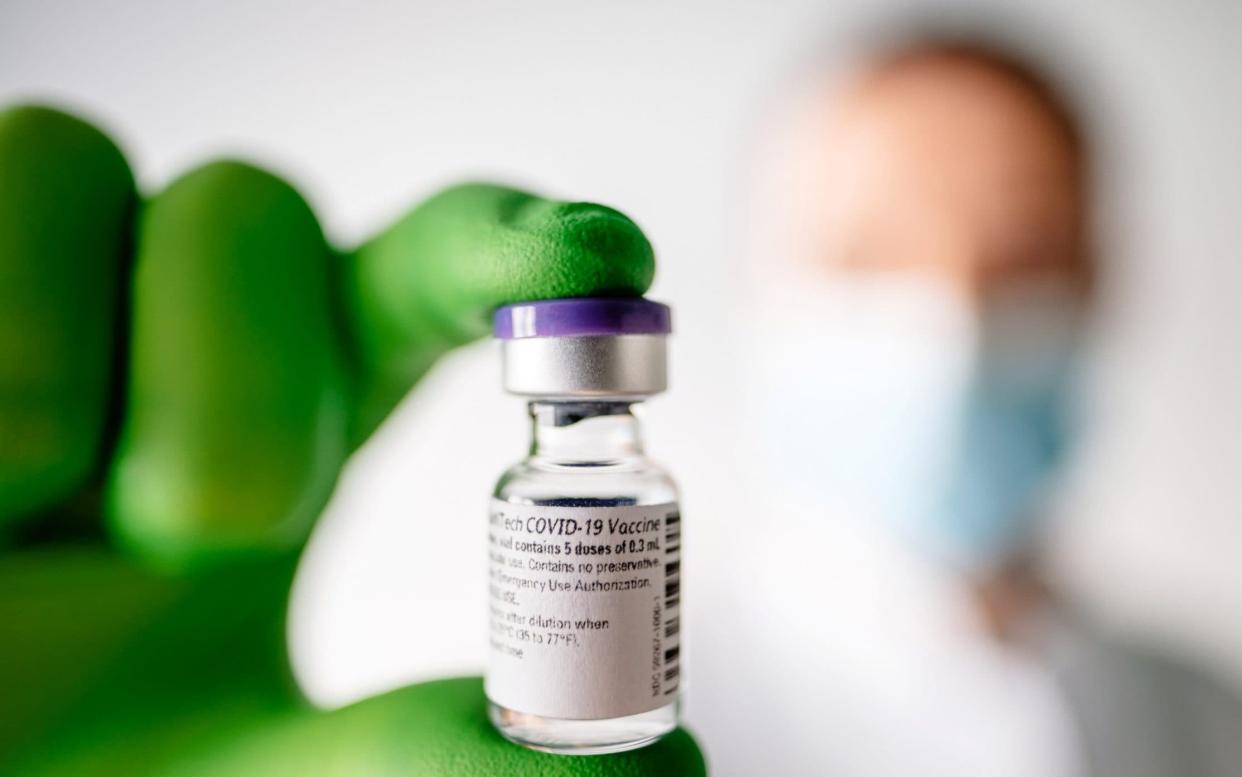The priority list for the Pfizer vaccine - and how it will be rolled out


On December 2, the Pfizer/BioNTech vaccine was approved by regulators for use in Britain, paving the way for mass vaccinations to begin.
In a press conference on the evening of the approval, Boris Johnson announced that we have been waiting for a “searchlight of science” to “pick out our invisible enemy” but “now the scientists have done it”.
But who will receive the vaccine first?
Care home residents and their carers should be the first people to receive this new Pfizer coronavirus vaccine, according to official advice.
The Joint Committee on Vaccination and Immunisation (JCVI), which advises ministers, said vaccines should be prioritised for the the elderly and health workers.
The group have published their list of who they believe should get the vaccine first:
Explaining the priorities for who will get the vaccine, chairman of the JCVI Professor Wei Shen Lim said: "Vaccines are offered to protect people who are most at risk from dying of Covid-19, as well as to protect health and social care services, because by doing so we also protect lives."
Professor Lim said age was the single most important factor in the estimated risk of mortality, and everyone in the country older than 50 will be vaccinated by the time the end of phase one.
At a press conference on December 2, The Deputy Chief Medical Officer, Professor Van-Tam, suggested the priority list for vaccinations will cover 99% of Covid-related deaths, meaning restrictions may then begin to come to an end.
"The vaccine appears to be safe and well-tolerated, and there were no clinically concerning safety observations," according to the JCVI, which added that the data indicates it is highly effective across all age groups.
The Joint Committee on Vaccination and Immunisation (JCVI) has also prioritised key workers in the queue for immunisation. Therefore, transport workers, first responders and teachers will be among the first to receive the jab in the second phase of the vaccine rollout.
Health Secretary Matt Hancock said 800,000 doses of the jab will arrive next week, with millions more to follow. In total the UK has ordered 40million doses of the vaccine, enough to vaccinate 20million people.
But rolling it out will be a challenge, with NHS boss Simon Stevens describing it as the "largest scale vaccination campaign in our country’s history".
Sir Simon Stevens also shared more about who would receive the second doses, sharing they would be reserved for those getting the first dose in December.
Sir Stevens said: “We need to be very careful through December and into January and then as vaccination expands to the wider population”. He went on to add that a phasing of delivery would involve 50’ hospital hubs’ which will offer the jab from the week beginning December 7 to the over-80s, care home staff and others identified by the Joint Committee on Vaccination and Immunisation.
The Chief Executive said patients are likely to be people who were scheduled to attend outpatient appointments, which will eventually be followed by over 1000 vaccination centres in due course.
Three modes of delivery
Mr Hancock said there would be "three modes of delivery" of the vaccine, with hospitals, mass vaccination centres and GPs and pharmacists offering the jab to those most in need.
Speaking on Wednesday he said: "Fifty hospitals across the country are already set up and waiting to receive the vaccine as soon as it's approved, so that can now happen.
"Also vaccination centres, which will be big centres where people can go to get vaccinated. They are being set up now.
"There will also be a community rollout, including GPs and pharmacists."
On December 2, The Deputy Chief Medical Officer shared the rollout would take "months, not weeks", meaning it is essential to continue following the new tier system rules.
Professor Van-Tam said: "Nobody wants lockdown. But if you want that dream to come true as quickly as it can come true, then you have to take the vaccine when it is offered to you."
The Armed Forces and NHS have begun urgent preperations for the centres have have been told they should be completed within a fortnight, according to sources.
Military personnel have been ordered to transform about 10 sites into vaccine hubs, including the Nightingale hospital at the London ExCel centre, Epsom racecourse, in Surrey, and Bristol's Ashton Gate football stadium and Robertson House conference facility in Stevenage will serve the capital and south of England, according to sources.
The vaccine will then also be rolled out to GPs and Pharmacists that have the capacity to store the vaccine at the -70C it needs to stay effective.
In the response criticism that the temperature of the vaccine would make it difficult to be issued around care homes, Professor Van-Tam argued that it was "extremely unfair when one considers a new virus emerged less than 12 months ago and we now have our first vaccine".
The Deputy Chief Medical Officer continued: "This is a complex product. It is not a yoghurt that can be taken out of the fridge and put back in several times."
The NHS has been preparing for a mass vaccination programme for several weeks and could have up to 1,500 GP practices and drive-through centres ordered to open from 8am to 8pm every day, each dispensing at least 1,000 jabs a week.
Under the current plans, local clusters of about five practices covering approximately 50,000 patients, known as Primary Care Networks, will combine to organise vaccine delivery and the health service is hoping to immunise one million people per week.
However any potential rollout will be limited by the speed of manufacture in Belgium, with plans to distribute "as rapidly as company can manufacture".

